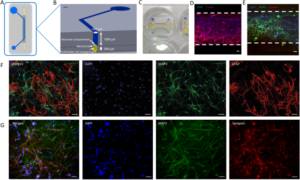 NOCI researcher Heleen Middelkamp from the University of Twente has published a paper in Scientific Reports on January 26th, where she and the co-authors demonstrated that culturing neurovascular unit (NVU) cell types on microfluidic chips changes their gene expression profiles.
NOCI researcher Heleen Middelkamp from the University of Twente has published a paper in Scientific Reports on January 26th, where she and the co-authors demonstrated that culturing neurovascular unit (NVU) cell types on microfluidic chips changes their gene expression profiles.
Middelkamp, H.H.T., Verboven, A.H.A., De Sá Vivas, A.G. et al. Cell type-specific changes in transcriptomic profiles of endothelial cells, iPSC-derived neurons and astrocytes cultured on microfluidic chips. Sci Rep 11, 2281 (2021). https://doi.org/10.1038/s41598-021-81933-x
In vitro models are very important for understanding disease processes and for drug development. Most of the current systems lack the complexity that is present in the human body, such as different cell types or presence of blood vessels. Organs-on-chips are microfluidic systems with multiple channels in which different cell types can be cultured as well as adding a more “in vivo” like 3D environment. Before using these models in disease modeling or drug development, it is important to know if cells behave differently when cultured on these devices.
The researchers cultured different cell types important to the NVU, such as neurons, astrocytes and endothelial cells, on either the organ-on-chip device or a standard well plate and looked at differences in RNA-expression profiles. They saw a difference in cells between the  two culturing devices. For example, they observed a higher maturity level of neurons when cultured on the organ-on-chip device. These observed differences were cell type specific and can be very interesting when designing and developing new models for disease modelling or drug development.
two culturing devices. For example, they observed a higher maturity level of neurons when cultured on the organ-on-chip device. These observed differences were cell type specific and can be very interesting when designing and developing new models for disease modelling or drug development.
Figure reproduced from Middelkamp, H.H.T., Verboven, A.H.A., De Sá Vivas, A.G. et al., Sci Rep 11, 2281 (2021). (CC BY 4.0)” https://doi.org/10.1038/s41598-021-81933-x
